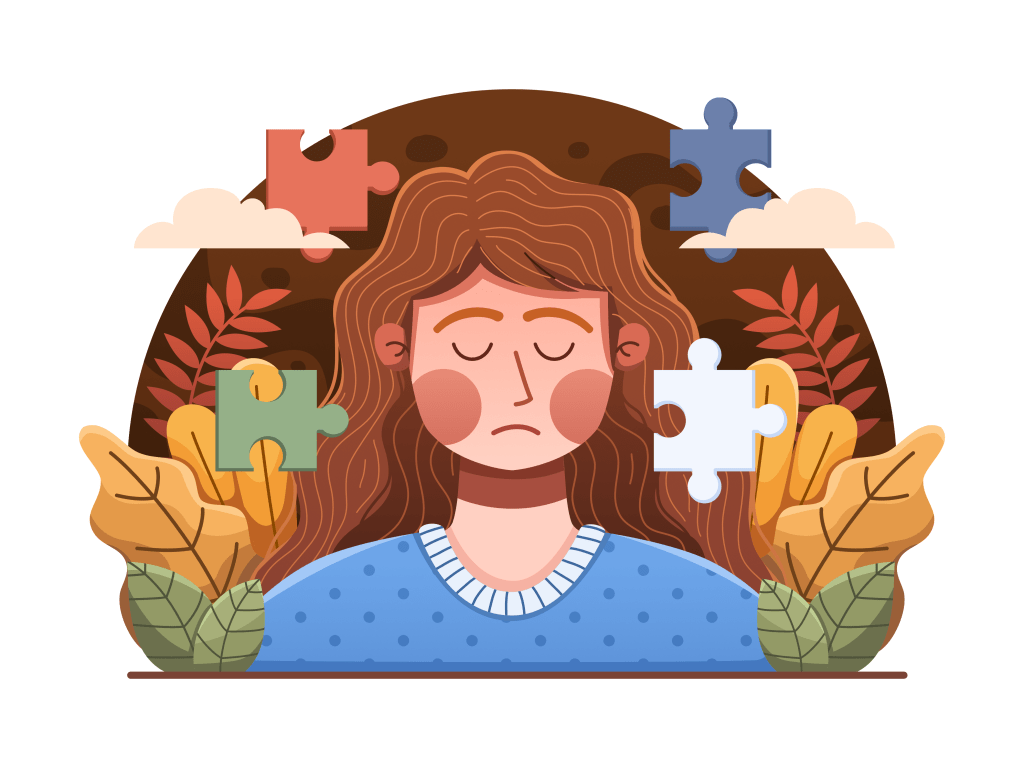Personality disorders are mental health conditions characterized by enduring patterns of behavior, cognition, and inner experience that deviate markedly from the expectations of the individual’s culture. These patterns, which are inflexible and pervasive across a broad range of personal and social situations, lead to significant distress or impairment in social, occupational, or other important areas of functioning.
Personality disorders typically emerge in adolescence or early adulthood and persist over time. They affect the way individuals perceive themselves, relate to others, and interpret events. These disorders can cause significant distress to the individuals experiencing them and often create challenges in forming and maintaining relationships.
Common features of Personality Disorders
Personality disorders are rooted in an individual’s fundamental way of thinking and interacting with the world. Due to their pervasive and enduring nature, personality disorders can be challenging to treat. Several factors contribute to the complexity of treating personality disorders:
- Ingrained Patterns: Personality disorders involve deeply ingrained behavior patterns that have become a fundamental part of the person’s identity. Changing these patterns often requires significant effort, time, and self-awareness.
- Limited Insight: Individuals with personality disorders may have limited insight into their condition. They might not recognize the impact of their behavior on themselves and others, making it difficult to engage them in therapy or other forms of treatment.
- Resistance to Change: The very traits that define personality disorders, such as distrust in others (in paranoid personality disorder) or fear of abandonment (in borderline personality disorder), can create resistance to change. Individuals may be resistant to therapy or may struggle with forming therapeutic alliances.
- Co-occurring Conditions: Personality disorders often co-occur with other mental health disorders, such as depression, anxiety, or substance abuse, which can complicate the treatment process.
- Interpersonal Challenges: Difficulties in forming and maintaining relationships, common in many personality disorders, can hinder the therapeutic relationship, making it hard for individuals to trust and collaborate with mental health professionals.
- Limited Treatment Options: While therapy, especially dialectical behavior therapy (DBT) and cognitive-behavioral therapy (CBT), has shown effectiveness in some cases, there is no one-size-fits-all approach for personality disorders. Treatment often requires a tailored, long-term approach.
- Stigma and Lack of Awareness: Stigma associated with mental health issues, including personality disorders, can prevent individuals from seeking help. Additionally, lack of awareness and understanding about personality disorders in the general population can lead to delayed or insufficient treatment.

Different types of Personality Disorders
According to the Diagnostic and Statistical Manual of Mental Disorders, there are several types of personality disorders, each with its own unique features. These disorders are grouped into three clusters based on similar characteristics:
Odd, Eccentric Disorders – Cluster A:
- Paranoid Personality Disorder:
- Excessive suspicion of others’ motives without justification.
- Unwarranted belief that others are exploiting, harming, or deceiving them.
- Reluctance to confide in others due to fear that information will be used against them.
- Reads hidden meanings into benign remarks or events.
- Schizoid Personality Disorder:
- Lack of interest in social or intimate relationships, including family.
- Prefers solitary activities and has little desire for close relationships.
- Emotional coldness, detachment, or flattened affect.
- Lack of close friends or confidants other than immediate family.
- Schizotypal Personality Disorder:
- Peculiar dress, speech, or behavior.
- Belief in special powers, such as telepathy or superstitions.
- Social anxiety and discomfort in close relationships.
- Odd thinking and speech patterns.
Dramatic, Emotional, or Erratic Disorders – Cluster B:
- Antisocial Personality Disorder:
- Persistent patterns of disregard for the rights of others.
- Deceitfulness, impulsivity, irritability, aggression, and lack of remorse.
- Repeatedly violating the law and engaging in impulsive behaviors.
- Disregard for the safety of oneself and others.
- Borderline Personality Disorder:
- Intense fear of abandonment, leading to unstable relationships.
- Unstable self-image, often marked by shifting goals and values.
- Impulsive and risky behaviors such as substance abuse, unsafe sex, and binge eating.
- Chronic feelings of emptiness and intense, inappropriate anger.
- Histrionic Personality Disorder:
- Constant seeking of reassurance, approval, or attention.
- Inappropriately seductive or provocative behavior.
- Rapidly shifting emotions and shallow expression of emotions.
- Belief that relationships are more intimate than they actually are.
- Narcissistic Personality Disorder:
- Grandiosity, need for excessive admiration, and a lack of empathy for others.
- Preoccupation with fantasies of unlimited success, power, brilliance, beauty, or ideal love.
- Sense of entitlement and the expectation of special treatment.
- Envy of others or belief that others are envious of them.
Anxious, Fearful Disorders – Cluster C:
- Avoidant Personality Disorder:
- Avoidance of social or work activities involving significant interpersonal contact.
- Fear of criticism, disapproval, or rejection, leading to reluctance to take risks.
- Preoccupation with being criticized or rejected in social situations.
- Inhibition in new interpersonal situations due to feelings of inadequacy.
- Dependent Personality Disorder:
- Difficulty making everyday decisions without excessive advice and reassurance from others.
- Need for others to assume responsibility for major areas of life.
- Difficulty expressing disagreement with others due to fear of loss of support.
- Urgent need to start a new relationship when one ends, even at the cost of dignity or self-respect.
- Obsessive-Compulsive Personality Disorder:
- Preoccupation with details, rules, lists, order, organization, or schedules to the extent that the major point of the activity is lost.
- Perfectionism that interferes with task completion.
- Excessive devotion to work and productivity at the expense of leisure and friendships.
- Rigidity and stubbornness.
Please note that these symptoms are generalizations, and a qualified mental health professional should diagnose any mental health condition. Additionally, individuals with personality disorders may not necessarily exhibit all of these symptoms, and the severity of symptoms can vary widely.

Treatment
Therapy and counseling can be incredibly beneficial for individuals with personality disorders. While the specific approach may vary based on the type and severity of the disorder, therapy can help individuals manage symptoms, improve relationships, and enhance overall quality of life. Here are some common therapy approaches and potential life changes achieved through therapy for personality disorders:
1. Cognitive-Behavioral Therapy (CBT):
CBT focuses on identifying and changing negative thought patterns and behaviors. It helps individuals with personality disorders recognize distorted thinking, manage impulsivity, and develop healthier coping strategies. In the case of disorders like borderline personality disorder, CBT can help manage intense emotions and reduce self-destructive behaviors.
2. Dialectical Behavior Therapy (DBT):
DBT is a specialized form of CBT designed for individuals with borderline personality disorder. It emphasizes mindfulness, emotional regulation, distress tolerance, and interpersonal effectiveness. DBT helps individuals build skills to manage intense emotions, improve relationships, and avoid self-harm.
3. Schema Therapy:
Schema therapy addresses longstanding, deeply rooted patterns or schemas that underlie personality disorders. It focuses on understanding and changing these schemas to develop healthier coping strategies and improve interpersonal relationships. Schema therapy is often effective for individuals with avoidant, dependent, or obsessive-compulsive personality disorders.
4. Mindfulness-Based Therapies:
Practices like mindfulness meditation can help individuals become more aware of their thoughts, emotions, and behaviors. Mindfulness-based therapies teach individuals to observe their experiences without judgment, which can be particularly helpful for managing symptoms of anxiety, impulsivity, and emotional instability.
5. Interpersonal Therapy (IPT):
IPT focuses on improving interpersonal relationships and communication skills. It’s beneficial for individuals with personality disorders characterized by difficulties in relationships, such as histrionic or narcissistic personality disorders. IPT helps individuals address communication patterns, express emotions effectively, and develop healthier relationship dynamics.
6. Supportive Therapy and Counseling:
Supportive therapy provides a safe space for individuals to express their thoughts and feelings. A supportive therapist can offer validation, empathy, and encouragement, which can be especially important for individuals who have experienced neglect or trauma in their early relationships.
Potential Life Changes Achieved through Therapy:
- Improved Relationships: Therapy can help individuals develop healthier relationship skills, leading to more stable and fulfilling interactions with others.
- Emotional Regulation: Learning techniques to manage intense emotions can lead to better emotional stability and reduced impulsive behaviors.
- Enhanced Self-Esteem: Therapy can help individuals challenge negative self-beliefs, leading to improved self-confidence and self-worth.
- Effective Communication: Developing effective communication skills can improve interpersonal relationships and reduce conflicts.
- Independence and Autonomy: Therapy can empower individuals to develop a stronger sense of self and reduce dependency on others for validation and support.
- Reduced Self-Destructive Behaviors: Therapy can help individuals find healthier ways to cope with emotional pain, reducing self-destructive behaviors such as self-harm or substance abuse.
- Increased Life Satisfaction: As symptoms are managed, individuals often experience an overall increase in life satisfaction and a greater sense of well-being.
It’s important to note that individuals with personality disorders may not be aware of the impact of their behavior on themselves and others, and they often do not seek treatment on their own. Treatment for personality disorders usually involves psychotherapy, and in some cases, medication can be helpful in managing specific symptoms. Early intervention and appropriate treatment can improve the quality of life for individuals with personality disorders and those around them.
Ready to begin? Start your online therapy journey today. Book your first session now.




